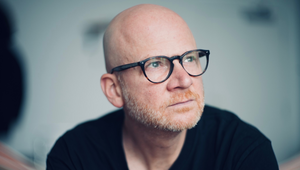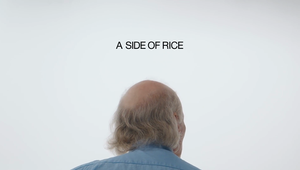
Paul Santana: “We’re Bringing ‘Art’ Back to the Film Set”

Has there ever been a better time to be a filmmaker? There’s no obvious answer to that question but, when it comes to technology, today’s directors have access to more tools - and more toys - than ever before.
It’s refreshing, then, to hear perspectives from the frontlines of ‘analog’ filmmaking. Whilst Paul Santana is no tech naysayer, he has an innate and impassioned understanding of the grit that often needs to go into highly-crafted filmmaking. And it shows in his work.
The director, who has recently joined the roster at Toronto-based boutique production house Feels Like Home, is able to look back on films for the likes of Budweiser, Samsung, Coca Cola, and Microsoft to name just a few. Prior to that, the LA-born filmmaker enjoyed success in narrative filmmaking with short films such as Oct 23rd. And when he’s not behind the camera, he’s making use of his post-production chops to help his imagery truly sing.
Here, Paul reflects on how photography helps inform his filmmaking, what makes Feels Like Home such a good fit, and why he’s not celebrating the advent of sophisticated AI just yet…
LBB> Paul, let’s start right at the beginning. What kind of a kid were you growing up, and how did you first pick up an interest in filmmaking?
Paul> It’s so cliche, but it’s so true…
When I was a kid a family friend gave me an amazing ILM book which was pretty much about the making of Star Wars. I was fascinated with this book, and couldn’t stop reading it and studying the pictures. I knew I needed to create like that; whether that be in VFX, cinematography, or directing, it didn’t matter at the time.
Also, Dick Smith’s brilliant work on The Exorcist had me spiral into a prosthetic make-up FX phase. Fangoria magazine was my bible.
LBB> You’ve mentioned that “there is something so rewarding about being in great amounts of pain to get a shot”. So - what’s the most painful shot you’ve ever made?!
Paul> That was a poorly-worded comment by me. I don’t really want to be in pain! I guess it was about overcoming it.
But certainly a few moments in Newfoundland come to mind - getting obliterated by mosquitos and climbing hip-deep through a bog, and then up the side of a mountain. This was all in time for sunrise, only to haul hundreds of pounds of gear back out the way we came.
Or in the bowels of a commercial fishing boat, knee-deep in fish, as the guts are thrown down on you.
Or in Thailand, crawling through a small tunnel of dirt to capture a magic angle of a temple, only to have half of it collapse from the weight of an elephant and break my leg. The shot was cool, but the flight home really sucked!
LBB> We’ve heard that you’re just as comfortable in a post environment as you are on-set. Why is that, and why is it valuable for a director to have an eye on post when possible?
Paul> So much of my early career was full of VFX work, so I learned the process. Then when I would shoot films for myself, my VFX friends weren’t typically available - or too rich to help me - so I learned to get by with the 2D work I could do and taught myself. I have become much more adept over the years. That has also expanded into colouring, cutting, and sound designing my own personal projects.
Why is it valuable? Well, I suppose it gives me an advantage to quickly know what is possible, what tools are needed, and the smartest way of doing it. Having this background has helped me problem-solve many FX and budget puzzles, and gives me the confidence to know I’m not speaking out of my ass.
Having done it myself there is a certain shorthand between me and the VFX team or post team. And when the budget is insanely tight and there is not another dollar for VFX, I often say “let’s not lose that shot. I will do it myself.” Of course the post peeps hate to hear this and often just say “don’t worry about it, we’ll do it.” Ha.
But overall, having a decent editorial background never hurts a filmmaker.
LBB> You’ve also mentioned that Feels Like Home’s roster felt like, well, home for you as a director. Can you expand on why that is and what makes it such a natural creative fit for you?
Paul> I guess when I look at a roster I don’t want to see a bunch of me’s. There are a few different schools of thought on this. Some people may say that you want to see others just like you as that is the work the company attracts, or something along those lines. This may be true to some extent. I don’t know.
But I am more from the school of thought that the roster should feel like it has a soft bed for you to lie in - where you get your own bed. FLH gives me my own plush bed. I feel as though my work is a nice compliment to the FLH roster, and not just more of the same.
LBB> From Odds for the American Cancer Society to your short films, it feels like there have been a lot of significant projects in your filmmaking journey so far. But are there any which stand out in your mind as being especially memorable or important to you?
Paul> I am very proud of my piece called Climate of Change. Of course we read a lot about what our future may hold, and we hear the predictions of many. But, to actually get a visceral glimpse at a possible future is a powerful thing. The film really hits the exact note I was hoping for, and my actors did an amazing job.
Above: ‘Climate of Change’, a PSA directed by Paul.
LBB> In addition to your work as a director, you’ve also dabbled in photography. To what extent do those two pursuits inform or inspire each other?
Paul> Much of my formal schooling was done at Brooks Institute in Santa Barbara, CA. It doesn’t exist anymore, but at the time it was Rochester Institute of Technology on the East Coast and Brooks on the West Coast battling it out for top dog.
Creating imagery is creating imagery, whether it be in stills or motion. I see still work as a great building block to expand out from. Meticulously studying a single frame of film and all that goes into capturing it sure sounds like a good place to start.
LBB> You strike us as someone who celebrates the craft of filmmaking, even - or especially - when it poses a significant challenge. We’re having this conversation at a time where there’s a lot of hype around virtual production and new technologies. Does any of that excite you, or do you see it as negatively impacting your craft?
Paul> I am pitching a job as we speak which will fully utilise virtual production. I think it is awesome - a technique is a technique. Way back before my time, it was rear and front screen projection and now we are revisiting that idea just with a whole hell of a lot more tools and capabilities.
I have always found green screen to be such a pain in the ass and so soul-crushing to shoot on or for an actor to perform against. With virtual production or 'volume' work, we are creating real-time imagery again and the live 'art' of it is back on set.
LBB> And what about artificial intelligence - is that something for which you are broadly excited or broadly fearful?
Paul> Now this one is a mixed bag for me. The ramifications are so unknown, but in some regards totally predictable. I grew up with a brilliant scientist father who always had to have the first of any technology, including the first CD player which was about the size of a microwave. I just recently got him a Midjourney account to play around with.
So it has been instilled in me from an early age to approach new technology with a smile and childlike curiosity. This being said…hmmmm.
I do dabble quite a bit in AI for image generation. I spend hours upon hours creating imagery, building worlds, you name it. I absolutely love it from that standpoint. Quick communication of ideas, worldbuilding, experimentation, design, and personal fun.
But. Where will this go? Where does it cross the line into creative infringements? When does it replace background actors? Replace principle talent? Replace writers? Replace me? When does Terminator become our reality, and we all die at the hands of a ruthless killing machine? Or our water supply, launch codes, and bank collapse. Yikes, I can't think of it anymore. It’s a fascinating time, but I understand the fear.
LBB> Finally, imagine you had the ability to travel back in time and give one piece of advice to yourself at the start of your career. What would you say and why?
Paul> I would tell myself to photograph the exterior of every hotel door I stay at. Same exact lens, framing, crop, etc.
I thought of this idea only a few years back, but I think it would be so cool to have a massive wall-sized collage of prints of every single hotel door I have stepped through on jobs over the years. From the fancy opulent door to the boutique door to the plain nothing door and also the rundown shithole door. I thought about starting this a few years back, but just got frustrated about all the ones I didn’t get from years past so it still remains only a dream…
Also, I would tell my twenty-something self to start collecting Air Miles early on! Dummy.















